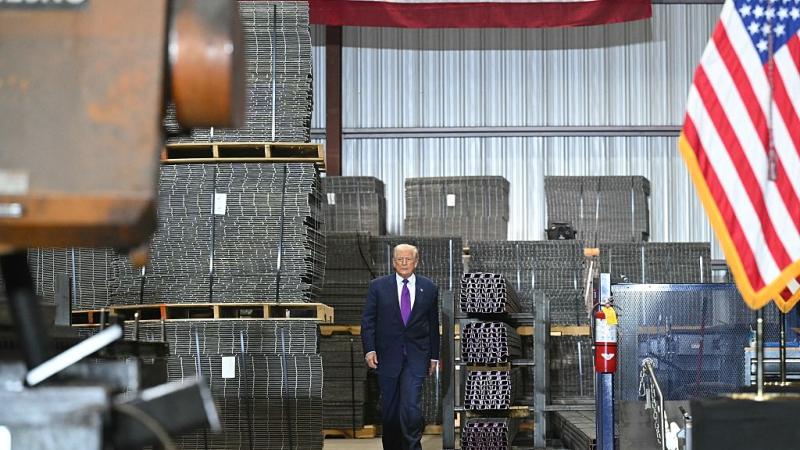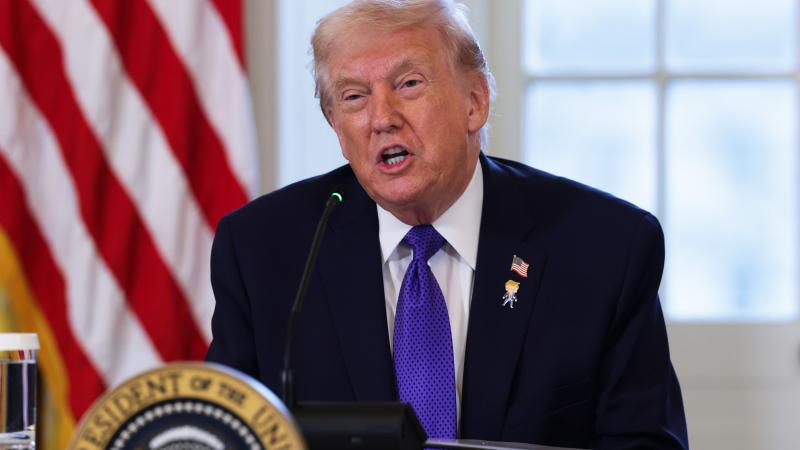Harris may find the Biden economy a high hurdle just as she gets her campaign footing
With her record and position inextricably linked to the current administration, Harris will face the challenge of shaping her own message while still playing defense on her old running mate’s still-developing record.
Vice President Kamala Harris’s sudden role as the Democratic standard bearer and her recent polling surge could soon come face to face with what may prove an insurmountable hurdle for her campaign: the Biden economy.
With her record and position inextricably linked to the current administration, Harris will face the challenge of shaping her own message while still playing defense on her old running mate’s still-developing record.
President Joe Biden currently enjoys a 38.4% approval rating for his handling of the economy, while 58.9% disapprove of his performance in the RealClearPolitics polling average. Though already low, Biden’s approval figure may have been buoyed by a string of solid topline economic figures, namely jobs reports, lower inflation, and record-breaking figures on key stock market indices.
But that streak appears to be coming to an end, with the NASDAQ falling to near-correction territory on Friday. The index fell 2.2% on Friday, placing it down 10.2% from its last record high, Reuters reported. The jobs report, moreover, fell short of analyst expectations, with the economy adding 114,000 jobs in July. The Dow Jones estimate had been 185,000. The unemployment rate, meanwhile, rose to 4.3% from the June figure of 4.1%.
It remains unclear how the deteriorating economic situation could impact the Federal Reserve’s decision on rate cuts at its next meeting in September. Even a substantive rate cut, however, would likely not result in a material improvement for the average voter by the time they head to the polls. Federal Reserve Chairman Jerome Powell indicated this week that the Fed was open to lowering interest rates, but that it had not committed to doing so.
“A reduction in our policy rate could be on the table as soon as the next meeting in September,” he said, according to Barron’s. “We're getting closer to the point at which it will be appropriate to reduce our policy rate, but we're not quite at that point yet.”
The current administration often refers to itself as the “Biden-Harris administration” rather than solely the Biden administration and Harris herself has often emphasized her role and contributions to the president’s agenda. But should the Biden economy continue to deteriorate, that association could prove detrimental.
Industry experts see a possible downturn.
In May of this year, JPMorgan Chase CEO Jamie Dimon warned that the U.S. economy could not rule out the prospect of a “hard landing” and that the “the worst outcome for all of us is what you call stagflation, higher rates, recession,” CNBC reported.
Such sentiment has returned amid the softening jobs market, low earnings in the tech industry, and a decline in consumer spending. Ahead of the jobs report, the New York Times described global markets as a “blur of red” and suggested that the situation could prompt the Fed to enact a major rate cut to escape a “hard landing.”
Adding considerable fuel to the fire has been the misfortunes of the tech industry. Electric vehicle manufacturer Tesla, for instance, posted a 45% year-over-year decline in second-quarter profits last month, according to the Associated Press. Chip maker Intel, meanwhile, announced Thursday that it would cut more than 15,000 jobs in a bid to cut costs and to help the company recover, the New York Times reported.
The timing bodes poorly for Harris
With fewer than 100 days remaining until the election, a sudden downturn in an already struggling economy would leave the incumbent administration almost no time to take corrective action and achieve any results in time to significantly affect voter perceptions of the situation.
Comparably timed downward shifts, moreover, have previously spelled doom for incumbent presidents and members of the administration’s party alike.
In 2008, for example, then-Republican presidential nominee John McCain often polled ahead of former President Barack Obama for much of the year, though the race remained competitive. McCain last led Obama in the polls in mid-September, according to RealClearPolitics. The stock market, however, crashed late in the month, and along with the attendant financial crisis, coincided with a considerable shift toward Obama’s candidacy.
In 1992, moreover, former President George H.W. Bush suffered from the early 1990s recession that saw unemployment clear 8% in 1992.
Trump campaign pounces
While the Trump campaign previously contrasted the economic situation under Biden with that of Trump, the incumbent president’s departure from the race has Republicans racing to pin the administration’s economic record on Harris.
On economic matters, notably, Republicans have more concrete action from Harris to point to rather than merely trying to pin her to Biden’s coattails. Harris, for instance, cast the tie-breaking vote to pass the 2021 COVID-19 stimulus package, one of many spending bills on which Republicans have blamed the spike in inflation.
“Kamala Harris has proudly and repeatedly celebrated her role as Joe Biden’s co-pilot on ‘Bidenomics.’ She cast tie-breaking votes in the Senate for spending that put inflation on steroids, and despite the evidence that America’s working families are hurting she tells us these failed plans are working,” Trump Campaign National Press Secretary Karoline Leavitt said in a press release on Friday. “The basic necessities of food, gas and housing are less affordable, unemployment is rising, and Kamala doesn’t seem to care.”
‘Kamalanomics’
The Republican National Committee, meanwhile, reworked the “Bidenomics” label to “Kamalanomics” in a comparable bid to link her with the declining economy.
Deeming her interests to be “America Last,” the RNC press release seized on the numbers, but specifically highlighted the imbalance of the economic fortunes of American-born workers as opposed to foreign laborers.
“Foreign-born workers, meanwhile, are thriving in Kamala's economy. 1.2 million native-born Americans lost employment over the last year, while 1.3 million foreign-born workers found jobs,” the press release asserted.
“Does anyone really think Kamala can handle a recession? She can't even handle taking a question from the press,” it concluded. Harris has avoided any sit-down interviews or press conferences since becoming the likely Democratic presidential nominee.
A pivotal issue in swing states
While the economy is a nationwide issue, its health or lack thereof could prove a decisive factor in the handful of battleground states likely to swing the election, such as Arizona.
Speaking on the “Just the News, No Noise” television show this week, Arizona GOP House candidate Abe Hamadeh suggested that the rising cost of living was weighing heavily on voters in the Grand Canyon State.
“For so many people in Arizona and all across the country in my district, the rising inflation is out of control, especially here in Arizona, it's just it really has skyrocketed,” he said. “I've been to senior retirement communities where some of these people have to go homeless because their income, their rent has increased 20% in the last two years. So, it's unsustainable.”
“And I know President Trump is going to… reawaken the economy with energy dominance. So this is the type of ideas that people are looking for,” he insisted.
Speaking on the “John Solomon Reports” podcast, Trafalgar pollster Robert Cahaly suggested that the economy was Trump’s most effective angle for attacking Harris and that he would be well-served to focus primarily on that issue.
“When Donald Trump is talking about growing the American economy, building new great cities, baby boom, no taxes on tips. Donald Trump is winning,” he said. “When he gets into that petty stuff with her, he's not winning.”
“They've got to be focusing this stuff, right, the economy as it comes down,” Cahaly went on. “I mean, even if the Fed cuts the rate, that is not going to be felt by election day. They can’t cut it enough that all of a sudden, you know, Gen Z think they got a shot at buying a house right now.”
“The Republicans and Trump especially need to make the positive argument – the idea that Biden is all about cutting your student loan. I'm all about you getting a job that’s so good your student loan payment ain't a problem,” Cahaly said.
Ben Whedon is an editor and reporter for Just the News. Follow him on X.
















